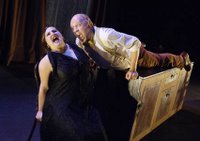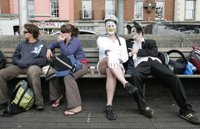
Here's what's great about the Internet. You can go and see a play that is layered with many meanings, and then come home and look up and see what everyone else thought the play was about. Although I often find the programme helpful, it usually only tells you what the playwright, director, and artistically contributing cast members think the play is about. And sure, what would they know?
On the face of it, Happy Days is a Samuel Beckett play in which a woman is buried up to her waist in sand, and her husband crawls about somewhere behind where she is buried. Then, in the second half SPOILER ALERT! she is buried up to her neck, and we are not sure, and she is not sure, if her husband is still alive or if he has died some time while we were off having drinks at the bar during the interval and talking about how nice the seats are in the Abbey nowadays. The woman, Winnie, reminisces about her life and tries to keep herself occupied and cheerful as her life moves from one day to the next, punctuated by startlingly loud bells that tell her when to wake and when to sleep. Although we couldn't figure out whether the bell was ringing more often in the second part because she was falling asleep more often, or whether she was falling asleep more often because the bell was ringing to tell her to, or because several days were passing in a brief period, or what. We then decided that this was how it is when you are reaching the end of your life and you live in an institution, and you can't tell where one day ends and one begins except for the bell, but which bell was it that you heard?
Happy days indeed.
And, of course, there is no great reason for Winnie to be at the end of her days, because she is only 50. So what is happening to her? Luckily for us, Sinead's mam was at the play with her that night, and she said that the play is about dementia. She recognized this for herself immediately, because it had occurred in her family. And, of course, such a reading makes total sense. Clinging on to routines and vague memories, trying to keep herself above the rubble when, all the time, she is increasingly immobilized by the disintegration of her own mind. I haven't seen anyone else give it this reading. The Irish Independent's reviewer suggested it was about love and marriage. I scoffed at the very notion. The Tribune review is more interesting, because it tells you about the controversy that surrounds Deborah Warner and Fiona Shaw's interpretations of Beckett (indeed, in this production, Warner has replaced the sand in which Winnie is normally buried with a blasted, rubble-filled landscape, so that Winnie looks a little as though she has gone on holiday to Marbella but her hotel has fallen on her), but even his suggestion that Fiona Shaw "just about" pulls off what is essentially quite a boring play seems all wrong to me.
I was completely riveted by this play from the minute it started. I felt like I got it. I could empathise with the feeling, the fragments and stories that Winnie tried to communicate to her husband, herself, her audience, felt more real to me than anything else by Beckett I've ever seen. Maybe it's just Fiona Shaw. She is absolutely amazing. How she can give such a totally naturalistic performance in such an unnatural play is beyond me, but she does. But more than that, the structure of the play is familiar and understandable, even as it is horrible and unnerving. And by the end, I wanted to run down onto the stage and dig her out with my own bare hands.
And that's all without even mentioning the gun, Brownie, which deserves a whole essay all on its own (and no doubt has many devoted to it, perched on the edge of some English lecturer's desk somewhere), and which Winnie pulls out of her big, black, handbag along with her other ordinary totems, including her nail file and her compact mirror. She addresses the gun (but does not call it Sweetness), then decides she will leave it out. Just right here.
She's just going to leave it right here.
And right here it stays.
And you can't put it out of your mind, and somehow can't believe that she has ever put it out of her mind. She occasionally wanders back to it, suggesting it as a kind of fallback option if all else fails, but there's no real feeling that she's going to use it, at least not while she has the use of her arms. After that, of course, it will be too late.
Unless there was someone around who understood her and love her and knew what she would want.
So maybe it is a play about love after all.







